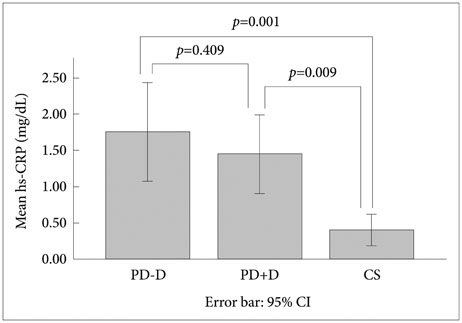Dement Neurocogn Disord.
2015 Sep;14(3):123-127. 10.12779/dnd.2015.14.3.123.
Clinical Implication of High Sensitivity C-Reactive Protein for the Development of Dementia in Parkinson's Disease
- Affiliations
-
- 1Department of Neurology, College of Medicine, The Catholic University of Korea, Seoul, Korea. siuy@cmcnu.or.kr
- 2Department of Neurology, Veterans Health Service Medical Center, Seoul, Korea.
- KMID: 2442988
- DOI: http://doi.org/10.12779/dnd.2015.14.3.123
Abstract
- BACKGROUND AND PURPOSE
High-sensitivity C-reactive protein (hs-CRP) is the most widely studied biomarker of systemic inflammation. Its level has been reported to be associated with cognitive impairment. While dementia and cognitive impairment are common non-motor symptoms in advanced idiopathic Parkinson's disease (PD), the clinical value of hs-CRP for predicting dementia in PD patients remains unclear. Therefore, the objective of this study was to clarify the relationship between hs-CRP levels and the development or progression of dementia in PD through evaluating hs-CRP levels in PD patients with or without dementia.
METHODS
A total of 112 PD patients without dementia (PD-D), 103 PD patients with dementia (PD+D), and 94 healthy controls were used in this study. The levels of hs-CRP and cognitive function were analyzed among these three groups.
RESULTS
The mean serum hs-CRP levels in PD-D and PD+D were 1.76+/-3.62 mg/dL and 1.44+/-2.78 mg/dL, respectively, which were significantly (p=0.02) higher than that (vs. 0.41+/-1.06 mg/dL) in healthy controls. However, the levels of hs-CRP were not significantly (p>0.05) different between PD-D and PD+D.
CONCLUSIONS
Our results suggest that neuro-inflammation plays a role in the pathogenesis of PD. However, it does not significantly contribute to the development or the progression of dementia in PD patients.
Keyword
Figure
Reference
-
1. Wilms H, Zecca L, Rosenstiel P, Sievers J, Deuschl G, Lucius R. Inflammation in Parkinson's diseases and other neurodegenerative diseases: cause and therapeutic implications. Curr Pharm Des. 2007; 13:1925–1928.
Article2. Orr CF, Rowe DB, Mizuno Y, Mori H, Halliday GM. A possible role for humoral immunity in the pathogenesis of Parkinson's disease. Brain. 2005; 128(Pt 11):2665–2674.
Article3. Anang JB, Gagnon JF, Bertrand JA, Romenets SR, Latreille V, Panisset M, et al. Predictors of dementia in Parkinson disease: a prospective cohort study. Neurology. 2014; 83:1253–1260.
Article4. Hirsch EC, Hunot S. Neuroinflammation in Parkinson's disease: a target for neuroprotection? Lancet Neurol. 2009; 8:382–397.
Article5. Lindqvist D, Hall S, Surova Y, Nielsen HM, Janelidze S, Brundin L, et al. Cerebrospinal fluid inflammatory markers in Parkinson's disease--associations with depression, fatigue, and cognitive impairment. Brain Behav Immun. 2013; 33:183–189.
Article6. McGeer PL, McGeer EG. Inflammation and neurodegeneration in Parkinson's disease. Parkinsonism Relat Disord. 2004; 10:Suppl 1. S3–S7.
Article7. Mancinella A, Mancinella M, Carpinteri G, Bellomo A, Fossati C, Gianturco V, et al. Is there a relationship between high C-reactive protein (CRP) levels and dementia? Arch Gerontol Geriatr. 2009; 49:Suppl 1. 185–194.
Article8. Engelhart MJ, Geerlings MI, Meijer J, Kiliaan A, Ruitenberg A, van Swieten JC, et al. Inflammatory proteins in plasma and the risk of dementia: the rotterdam study. Arch Neurol. 2004; 61:668–672.
Article9. Hughes AJ, Daniel SE, Kilford L, Lees AJ. Accuracy of clinical diagnosis of idiopathic Parkinson's disease: a clinico-pathological study of 100 cases. J Neurol Neurosurg Psychiatry. 1992; 55:181–184.
Article10. American Psychiatric Association. Diagnostic and statistical manual-text revision (DSM-IV-TRim, 2000). Washington, DC: American Psychiatric Association;2000.11. Hoehn MM, Yahr MD. Parkinsonism: onset, progression and mortality. Neurology. 1967; 17:427–442.
Article12. McKeith IG, Dickson DW, Lowe J, Emre M, O'Brien JT, Feldman H, et al. Diagnosis and management of dementia with Lewy bodies: third report of the DLB Consortium. Neurology. 2005; 65:1863–1872.
Article13. Chen H, Zhang SM, Hernán MA, Schwarzschild MA, Willett WC, Colditz GA, et al. Nonsteroidal anti-inflammatory drugs and the risk of Parkinson disease. Arch Neurol. 2003; 60:1059–1064.
Article14. Song IU, Kim JS, Chung SW, Lee KS. Is there an association between the level of high-sensitivity C-reactive protein and idiopathic Parkinson's disease? A comparison of Parkinson's disease patients, disease controls and healthy individuals. Eur Neurol. 2009; 62:99–104.
Article15. Orr CF, Rowe DB, Halliday GM. An inflammatory review of Parkinson's disease. Prog Neurobiol. 2002; 68:325–340.
Article16. Yasojima K, Schwab C, McGeer EG, McGeer PL. Human neurons generate C-reactive protein and amyloid P: upregulation in Alzheimer's disease. Brain Res. 2000; 887:80–89.
Article17. Di Napoli M, Godoy DA, Campi V, Masotti L, Smith CJ, Parry Jones AR, et al. C-reactive protein in intracerebral hemorrhage: time course, tissue localization, and prognosis. Neurology. 2012; 79:690–699.18. Juma WM, Lira A, Marzuk A, Marzuk Z, Hakim AM, Thompson CS. C-reactive protein expression in a rodent model of chronic cerebral hypoperfusion. Brain Res. 2011; 1414:85–93.
Article19. Schmidt R, Schmidt H, Curb JD, Masaki K, White LR, Launer LJ. Early inflammation and dementia: a 25-year follow-up of the Honolulu-Asia Aging Study. Ann Neurol. 2002; 52:168–174.
Article20. Song F, Poljak A, Smythe GA, Sachdev P. Plasma biomarkers for mild cognitive impairment and Alzheimer's disease. Brain Res Rev. 2009; 61:69–80.
Article21. Kravitz BA, Corrada MM, Kawas CH. Elevated C-reactive protein levels are associated with prevalent dementia in the oldest-old. Alzheimers Dement. 2009; 5:318–323.
Article22. Hsuchou H, Kastin AJ, Mishra PK, Pan W. C-reactive protein increases BBB permeability: implications for obesity and neuroinflammation. Cell Physiol Biochem. 2012; 30:1109–1119.
Article23. Lang AE, Lozano AM. Parkinson's disease. First of two parts. N Engl J Med. 1998; 339:1044–1053.
- Full Text Links
- Actions
-
Cited
- CITED
-
- Close
- Share
- Similar articles
-
- A Clinical Significance of High-Sensitivity C-reactive Protein Level in Alzheimer's Disease and Vascular Dementia
- Analysis of Apolipoprotein E Genotypes in Several Demential diseases
- The Role and Clinical Significance of High-Sensitivity C-Reactive Protein in Cardiovascular Disease
- Dementia with Parkinsonism
- Dementia-Free Survival and Risk Factors for Dementia in a Hospital-Based Korean Parkinson's Disease Cohort


